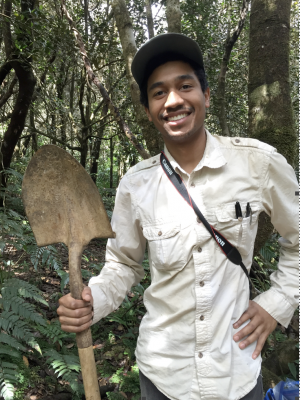Postdoc Spotlight: Justin Richardson

Justin Richardson is featured as part of Cornell’s Postdoc Appreciation Week 2017.
What is your area of emphasis? Why is this work important?
I am a low-temperature geochemist, focusing primarily on plant-soil-rock interactions in the Critical Zone. I study how nutrient metals derived from bedrock weathering cycle between plants and soils, and work to tease apart how toxic metals get to soils and plants from humans and rock weathering.
What inspired you to choose your field of study?
Since I was a child, I loved digging holes to look at what lived below the ground, like worms, bugs, and roots. It really fascinated me how plants and animals obtained nutrients for themselves from soils and rocks. Learning how soils retain nutrients and sequester toxic metals as a high school student and again as an undergraduate cemented by path.
How has your background influenced your scholarship?
Growing up in Southern California during the home building explosion illuminated to me how our society utilizes land and soil often without appreciating how it functions. A big goal of my research has been to highlight how important soils are beyond growing food.
What else has influenced your thinking as a researcher or scholar?
Being the Critical Zone Observatory Network Postdoctoral Fellow here at Cornell has been fantastic for interacting with a wide variety of researchers. Talking with hydrologists, physicists, and plant biologists about science has helped me keep my scope broad and avoid tunnel vision.
What other hobbies or activities do you enjoy in your spare time?
I really love low-temperature geochemistry and I consider many of my side experiments as a hobby. However, I do manage to find time weekly to play classical piano. I also have a miniature garden at home and keep aquatic plants and fish.
Why did you choose Cornell?
I chose Cornell primarily because of my adviser, Louis Derry. He is a fantastic scientist and very creative. I had never visited Central New York prior to accepting the position, but I had heard it was “gorges.”
What’s next for you?
I will be starting as an assistant professor at the University of Massachusetts Amherst in 2018. I had a wonderful time being an Ithacan and enjoying the fantastic community and culture here, but I am very excited to move back to New England.
Do you have any advice for current graduate students?
My advice is be open to as many opportunities as possible. You never know which way things will shake out. In addition, try to find the right balance in connecting with the local community here in Ithaca and engaging in the broader scientific community. It is too easy to get tunnel vision during graduate school and hide in your lab or office.
Interview by Sally Kral, communications and outreach assistant in the Graduate School
